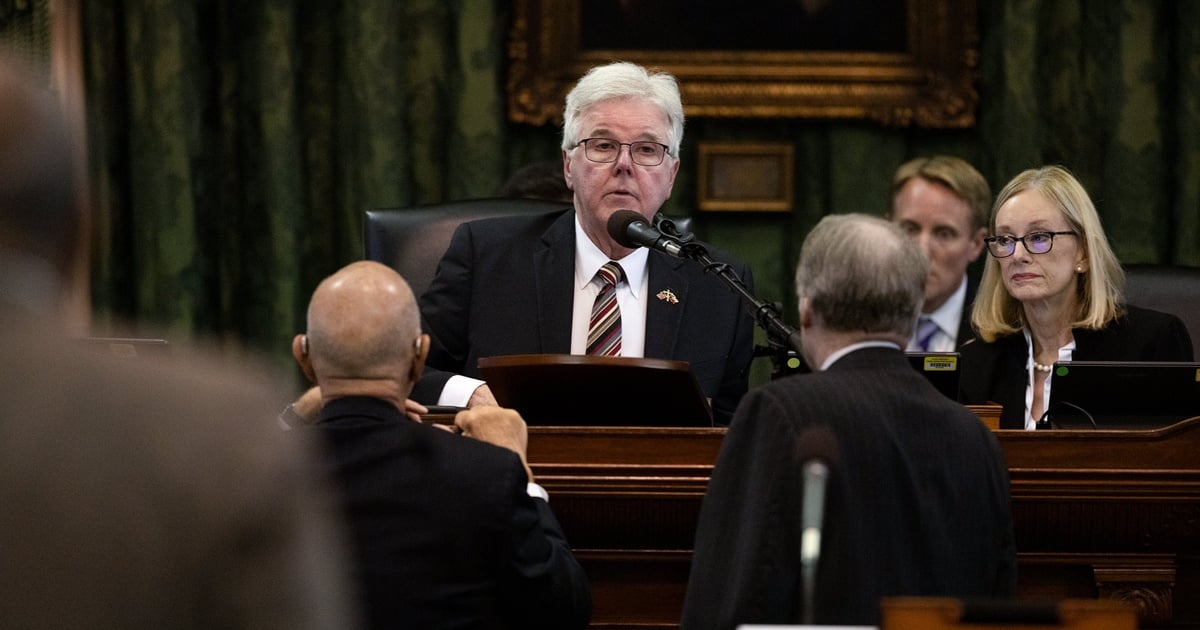Sign up for The Brief, The Texas Tribune’s daily newsletter that keeps readers up to speed on the most essential Texas news.
Lt. Gov. Dan Patrick said Tuesday that the Legislature will review all of the state’s existing contracts with the firm Deloitte after it selected a company whose CEO was previously convicted of an “embezzlement scheme” as a project finalist for a low-interest, taxpayer-funded loan program to build new power plants in Texas.
Last year, the state tapped Deloitte to administer the Texas Energy Fund, a $5 billion voter-approved fund to provide 3% interest loans to build or upgrade gas-fueled power plants. State lawmakers got the idea for the fund after Winter Storm Uri overwhelmed the state power grid in 2021, prompting blackouts that left millions of Texans without electricity or heat for days in freezing temperatures.
When the company and the state’s Public Utility Commission announced the list of 17 finalists in late August, they included a project from Aegle Power, whose CEO Kathleen Smith was convicted in 2017 in what the U.S. Justice Department called an “embezzlement scheme.” Aegle Power also included the name of another company, NextEra, which told the PUC it was included on the application without its knowledge or consent.
Patrick’s announcement of the review came after representatives from Deloitte were peppered with questions at a joint legislative hearing Tuesday about how these details were not uncovered in the vetting process. Smith previously told the Houston Chronicle there was “absolutely never any embezzlement.”
“When questioned at today’s hearing, Deloitte had no believable explanation for the many troubling details they failed to uncover during their vetting process,” Patrick said. “These details could have been revealed to them by a quick Google search.”
At the meeting, Deloitte representatives said they had not reached out to NextEra, the company that was listed in the application without their knowledge, because their process is not to reach out to applicants until the next phase of due diligence. But representatives acknowledged they should have included a more thorough review of applicants earlier in the process.
The PUC rejected Aegle Power’s application on Sept. 4 after the issues came to light. But the incident has put a cloud over the rollout of the fund, angering lawmakers and raising questions about the agency’s ability to run the program.
“The lack of due diligence is astounding to me,” said Sen. Charles Schwertner, R-Georgetown, during Tuesday’s meeting.
The most important Texas news,
sent weekday mornings.
The PUC was originally created to regulate the state’s electric utilities market, but its responsibilities have exploded since Uri after lawmakers passed laws to strengthen Texas’ power grid. Its budget ballooned and staff grew by 50%.
While the Legislature has increased funding and staff for the PUC over the past several years, lawmakers and experts said the agency likely needed more resources to handle all the new responsibilities it’s been given to shore up the grid and the state’s power market.
On Tuesday, PUC executives told lawmakers they relied too much on Deloitte’s reputation to administer the project and should have made sure they were executing the contract satisfactorily.
“We had too much of an arm’s length relationship with our contractor and I should have ensured we were more heavily involved in the review,” PUC Chair Thomas Gleeson said.
Gleeson previously stated the project never would have received a loan because of existing guardrails in the process, but told lawmakers that PUC will review its processes and cut Deloitte’s $107 million contract by at least 10 percent.
Patrick said in the letter Tuesday that he supported that effort stating that Deloitte must be held financially accountable for “their blunder that set back the Texas Energy Fund’s ability to help deliver more megawatts of dispatchable power in a timely fashion.”
Disclosure: Deloitte has been a financial supporter of The Texas Tribune, a nonprofit, nonpartisan news organization that is funded in part by donations from members, foundations and corporate sponsors. Financial supporters play no role in the Tribune’s journalism. Find a complete list of them here.


